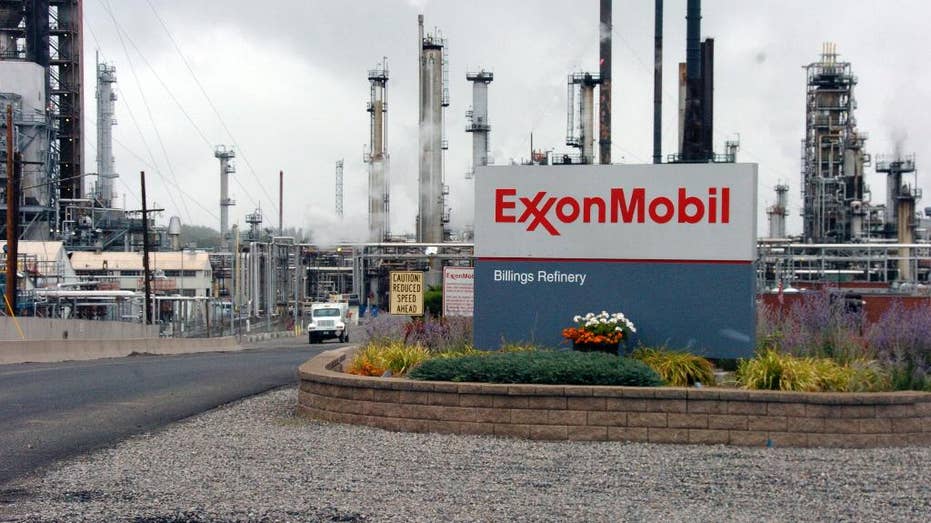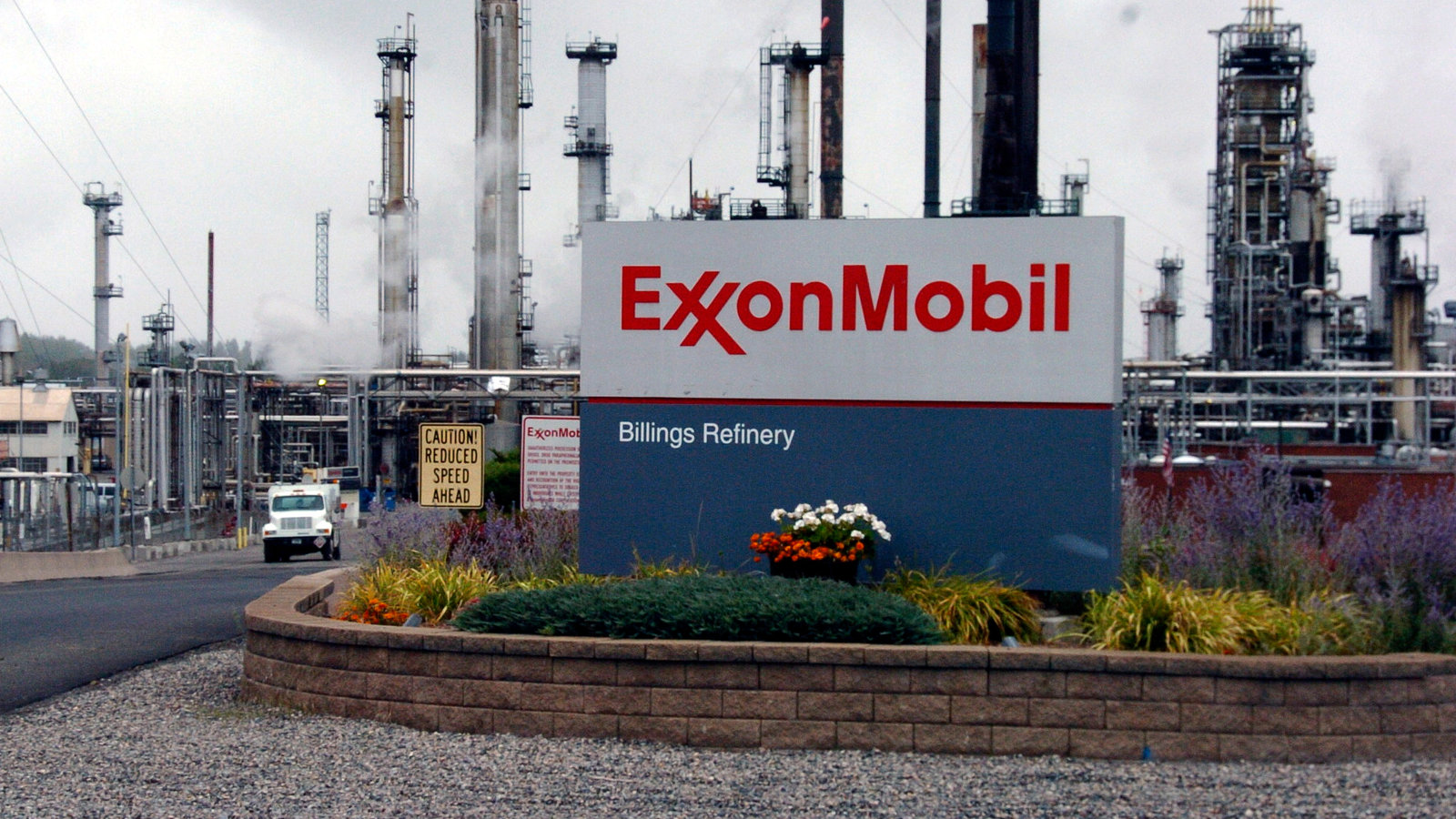Neal Dingmann's New Price Target for Exxon Mobil Corporation

- Neal Dingmann of Truist Financial sets a new price target of $124 for Exxon Mobil Corporation, indicating an 8.8% upside potential.
- The downgrade from Buy to Hold reflects a cautious outlook amidst anticipated growth and existing uncertainties.
- Exxon Mobil's operational decisions and environmental strategies remain focal points for investors and stakeholders, amidst market volatility and strategic challenges.
Neal Dingmann of Truist Financial recently set a new price target for Exxon Mobil Corporation (NYSE:XOM), a leading player in the global energy sector. With a rich history in oil and gas exploration and production, Exxon Mobil has been a significant figure in the energy industry, facing both market highs and lows alongside its competitors. Dingmann's price target of $124 suggests an optimistic outlook on the company's stock, despite a recent downgrade from Buy to Hold. This adjustment reflects a nuanced view of Exxon Mobil's current position and future prospects in the market.
At the time of Dingmann's announcement, Exxon Mobil's shares were trading at $113.97. This price point indicates an 8.8% upside potential to reach the newly set target. Such a forecast underscores a belief in Exxon Mobil's ability to grow or maintain its value in the near future. However, the downgrade to Hold signals a cautious stance, suggesting that while growth is anticipated, significant uncertainties or limitations may temper the company's stock performance.
In the backdrop of this financial analysis, Exxon Mobil's operational and strategic decisions continue to draw attention from investors and stakeholders alike. Vanguard, a major investment firm, recently expressed its support for Exxon Mobil's director nominees at the company's annual meeting. This endorsement from Vanguard, despite raising concerns about Exxon's legal actions against climate activists, highlights the complex interplay between corporate governance, environmental responsibility, and shareholder rights. Such dynamics are increasingly relevant in evaluating Exxon Mobil's position within the energy sector, especially as environmental scrutiny intensifies.
The company's stock performance, with a recent increase to close at $113.97, reflects ongoing investor interest and market movements. Over the past year, Exxon Mobil's shares have seen highs and lows, reaching up to $123.75 and dipping to $95.77, showcasing the volatility and risks inherent in the energy market. With a market capitalization of approximately $511.26 billion and a trading volume around 13.1 million shares, Exxon Mobil remains a heavyweight in the industry, navigating through market fluctuations and strategic challenges.
This financial and operational context sets the stage for understanding the implications of Dingmann's price target and the downgrade of Exxon Mobil's stock. As the company continues to address environmental concerns, shareholder rights, and market expectations, its stock performance will be a key indicator of its ability to adapt and thrive in the evolving energy landscape.
| Symbol | Price | %chg |
|---|---|---|
| YPFD.BA | 51650 | 0.15 |
| XOM.MX | 2143 | -0.37 |
| TGSU2.BA | 9120 | 0.22 |
| 2222.SR | 25.9 | 0 |

Exxon Mobil Corporation's Upcoming Quarterly Earnings Overview
- Exxon Mobil Corporation (NYSE:XOM) is anticipated to release its quarterly earnings with an estimated EPS of $1.81 and projected revenue of $83.6 billion.
- The company has outperformed earnings expectations in the last four quarters, with an average surprise of 4.87%.
- Financial health indicators such as a low debt-to-equity ratio of 0.15 and a current ratio of approximately 1.25 highlight Exxon Mobil's solid liquidity position.
Exxon Mobil Corporation, listed as NYSE:XOM, is a major player in the oil and gas industry. The company is involved in the exploration, production, refining, and marketing of crude oil and petroleum products. It operates through various segments, including Upstream, Energy Products, Chemical Products, and Specialty Products. Exxon Mobil is a key competitor to other oil giants like Chevron and Occidental Petroleum.
Exxon Mobil is set to release its quarterly earnings on October 31, 2025. Analysts estimate an earnings per share (EPS) of $1.81 and project revenue to be around $83.6 billion. However, the Zacks Consensus Estimate anticipates a slightly lower EPS of $1.78, marking a 7.3% decrease from the previous year. Revenue is expected to be $86.8 billion, reflecting a 3.6% decline from the prior year.
Despite these anticipated declines, Exxon Mobil has consistently surpassed earnings expectations in the last four quarters, with an average surprise of 4.87%. The company expects gains in refining, although it faces mixed impacts from oil and gas, alongside concerns about valuation and soft energy prices. Exxon Mobil's significant market activity is highlighted by its high dollar trading volume.
Exxon Mobil's financial metrics provide insight into its market valuation. The company has a price-to-earnings (P/E) ratio of approximately 16.26, indicating how the market values its earnings. Its price-to-sales ratio is about 1.51, and the enterprise value to sales ratio is around 1.58. These ratios reflect the company's market value relative to its revenue and total worth.
The company's financial health is further supported by its low debt-to-equity ratio of 0.15, indicating conservative debt usage. Exxon Mobil's current ratio of approximately 1.25 suggests a healthy liquidity position to cover short-term liabilities. Additionally, the enterprise value to operating cash flow ratio is around 9.60, providing insight into its cash flow generation relative to its valuation.

Exxon Mobil Corporation (NYSE:XOM) Stock Update and Future Outlook
- Scotiabank reaffirms its "Outperform" rating for Exxon Mobil Corporation (NYSE:XOM) and increases its price target from $125 to $128.
- Exxon Mobil anticipates a significant boost in its third-quarter earnings for 2025, driven by higher oil prices and strong refining margins.
- Despite a 4% decline over the past year, the company's robust earnings forecast and strong refining margins could signal a turnaround.
Exxon Mobil Corporation (NYSE:XOM) is a leading global oil and gas company involved in the exploration, production, and distribution of energy products. On October 9, 2025, Scotiabank reaffirmed its "Outperform" rating for XOM, with the stock priced at $113.77. Scotiabank also increased its price target for Exxon Mobil from $125 to $128, indicating confidence in the company's future performance.
Exxon Mobil anticipates a significant boost in its third-quarter earnings for 2025, driven by higher oil prices and strong refining margins. The company expects an increase in earnings by up to $300 million due to these favorable conditions. This optimism is reflected in Scotiabank's decision to raise the price target, suggesting potential growth in the stock's value.
Despite these positive projections, Exxon Mobil's stock has experienced a 4% decline over the past year, underperforming the industry's composite gain of 1%. This underperformance may concern investors, but the company's robust earnings forecast could signal a turnaround. The current stock price of $113.98 shows a slight decrease of 0.04, or approximately -0.04%, in its value.
Exxon Mobil's Energy Products segment is expected to contribute significantly to its earnings, with forecasts ranging between $300 million and $700 million. This segment benefits from positive industry refining trends, which could further support the stock's performance. Investors should consider these factors when evaluating the potential of XOM as an investment opportunity.
The company's market capitalization stands at approximately $485.9 billion, reflecting its substantial presence in the energy sector. With a trading volume of 3,463,938 shares on the NYSE, Exxon Mobil remains a key player in the market. The stock's fluctuation between a low of $113.73 and a high of $115.51 today indicates active trading and investor interest.

Exxon Mobil (NYSE:XOM) Maintains Strong Outlook Amid Energy Sector Rally
- Morgan Stanley maintains an "Overweight" rating for NYSE:XOM, raising its price target to $134 from $133.
- Energy analyst Ben Cook predicts crude oil prices to reach $60 per barrel by year-end, with higher expectations for the following year.
- XOM's market capitalization stands at approximately $489.1 billion, highlighting its significant presence in the energy market.
Exxon Mobil (NYSE:XOM) is a leading energy company involved in the exploration, production, and distribution of oil and natural gas. It operates globally and is a significant player in the energy sector. On July 15, 2025, Morgan Stanley maintained its "Overweight" rating for XOM, suggesting confidence in the stock's potential. The stock price at the time was around $113.46.
Morgan Stanley's decision to hold XOM and raise its price target to $134 from $133, as reported by TheFly, indicates a positive outlook. This aligns with energy analyst Ben Cook's insights on the potential for energy stocks, including XOM, amid a rally in nuclear and natural gas sectors. Cook anticipates crude oil prices to reach $60 per barrel by year-end, with expectations for higher prices next year.
Currently, XOM's stock price is $113.49, reflecting a slight decrease of 0.38%. The stock has traded between $113.33 and $115.23 today. Over the past year, XOM has seen a high of $126.34 and a low of $97.80. The company's market capitalization is approximately $489.1 billion, indicating its substantial presence in the market.
The natural gas market's strength, driven by increased energy demand from the AI sector, further supports the positive outlook for XOM. With a trading volume of 988,720 shares on the NYSE, XOM remains an active and significant player in the energy industry.

UBS Reiterates Buy on ExxonMobil, Sees Strong Q2 Despite Oil Price Headwinds
UBS reiterated its Buy rating and $130 price target on Exxon Mobil (NYSE:XOM) forecasting Q2 2025 adjusted EPS of $1.66—comfortably ahead of the Street’s $1.52 consensus—while highlighting continued strong operational performance despite commodity price pressures.
The analysts project adjusted upstream net income of $5.16 billion, down $1.59 billion quarter-over-quarter but still above consensus of $4.71 billion. Expected total production volumes of 4.57 million barrels of oil equivalent per day (mmboepd) are in line with Street estimates.
UBS noted the primary driver of sequential earnings decline will be lower oil and gas prices, with Brent crude falling around $8 per barrel expected to create a $1.3 billion headwind to upstream earnings. Additionally, lower natural gas prices—Henry Hub declining ~$0.20/mmbtu and TTF ~$2.50/mmbtu—are seen contributing another ~$160 million drag. UBS also flagged the absence of approximately $100 million in favorable divestment-related earnings that boosted the prior quarter.
Despite these near-term challenges, the firm remains positive on ExxonMobil’s operational execution and maintains its bullish outlook, expecting the company to continue delivering resilient performance through market cycles.

Exxon Mobil Corporation (NYSE:XOM) Overview: A Key Player in the Energy Sector
- Roger Read from Wells Fargo sets a price target of $127 for NYSE:XOM, indicating a potential increase of 17.19%.
- Exxon Mobil emphasizes expansion in power, renewables, and mining sectors at the JP Morgan Energy, Power, Renewables & Mining Conference.
- The company's stock shows volatility with a year high of $126.34 and a low of $97.80, alongside a market capitalization of approximately $467 billion.
Exxon Mobil Corporation, listed as NYSE:XOM, is a major player in the energy sector, focusing on oil, gas, and chemical operations. The company is known for its extensive global reach and significant influence in the industry. It competes with other energy giants like Chevron and BP. Recently, Roger Read from Wells Fargo set a price target of $127 for XOM, suggesting a potential increase of 17.19% from its current price of $108.37.
The recent JP Morgan Energy, Power, Renewables & Mining Conference, held on June 24, 2025, provided Exxon Mobil with a platform to discuss its strategies and developments. Jack P. Williams, the Senior Vice President, represented the company. This event is crucial for Exxon Mobil as it focuses on expanding its presence in power, renewables, and mining sectors, areas that are increasingly important in the energy landscape.
At the time of the conference, XOM's stock price was $108.37, showing a slight increase of 0.03, or approximately 2.77%. The stock has experienced fluctuations, with a daily low of $107.70 and a high of $109.24. Over the past year, XOM's stock has seen a high of $126.34 and a low of $97.80, indicating its volatility in the market.
Exxon Mobil's market capitalization is approximately $467 billion, reflecting its substantial size and influence in the energy sector. The trading volume of 17.47 million shares highlights the active interest in the company's stock. As the company continues to participate in significant industry events and discussions, it remains a key player to watch in the evolving energy market.

TD Cowen Lifts Exxon Mobil Price Target, Cites Earnings Strength
TD Cowen raised its price target on Exxon Mobil (NYSE:XOM) to $128 from $120 while maintaining a Buy rating, emphasizing the company’s strategic differentiation through advanced technology deployment and improved earnings visibility.
The firm noted that Exxon is increasingly positioning itself more like an industrial equity, leveraging innovation to boost resource recovery and enhance its deal-making flexibility. Recent developments supporting the bullish view include better-than-expected synergy potential from the Pioneer Natural Resources acquisition, the possibility of an arbitration ruling in the Hess deal within the next 90 days, and regulatory-dependent progress on the Baytown hydrogen project.
TD Cowen continues to list Exxon as a Top Pick, with the higher price target reflecting stronger near-term earnings. The firm’s valuation is anchored on a net present value model of free cash flow, using 2030 as the terminal year, underscoring confidence in Exxon’s ability to deliver durable value amid a shifting energy landscape.

Exxon Mobil Corporation (NYSE:XOM) Stock Update and Analyst Ratings
- Piper Sandler updated its rating for Exxon Mobil Corporation (NYSE:XOM) to "Hold" with the stock trading at $102.12.
- The company has an Average Brokerage Recommendation (ABR) of 1.85, indicating a position between Strong Buy and Buy.
- Exxon's market capitalization stands at approximately $440.1 billion, with a trading volume of 12.1 million shares.
Exxon Mobil Corporation (NYSE:XOM) is a leading player in the oil and gas industry, known for its extensive operations in the exploration, production, and distribution of petroleum products. As a major energy company, Exxon competes with other industry giants like Chevron and BP. On May 28, 2025, Piper Sandler updated its rating for Exxon to "Hold," with the stock trading at $102.12 at the time.
Despite Piper Sandler's "Hold" rating, Wall Street analysts maintain a generally optimistic view of Exxon. The company has an average brokerage recommendation (ABR) of 1.85, indicating a position between Strong Buy and Buy. Out of 26 brokerage firms, 16 have rated Exxon as a Strong Buy, representing 61.5% of all recommendations. This positive sentiment could influence investor decisions.
Exxon's current stock price is $102.12, reflecting a 1.4% decrease or $1.4 drop. The stock has fluctuated between $101.80 and $104.43 today. Over the past year, it has reached a high of $126.34 and a low of $97.80. These fluctuations are common in the stock market and can be influenced by various factors, including analyst ratings and market sentiment.
Exxon Mobil's market capitalization is approximately $440.1 billion, highlighting its significant presence in the energy sector. The company's trading volume for the day is 12.1 million shares, indicating active investor interest. As a major player on the New York Stock Exchange, Exxon's performance is closely watched by investors and analysts alike.







